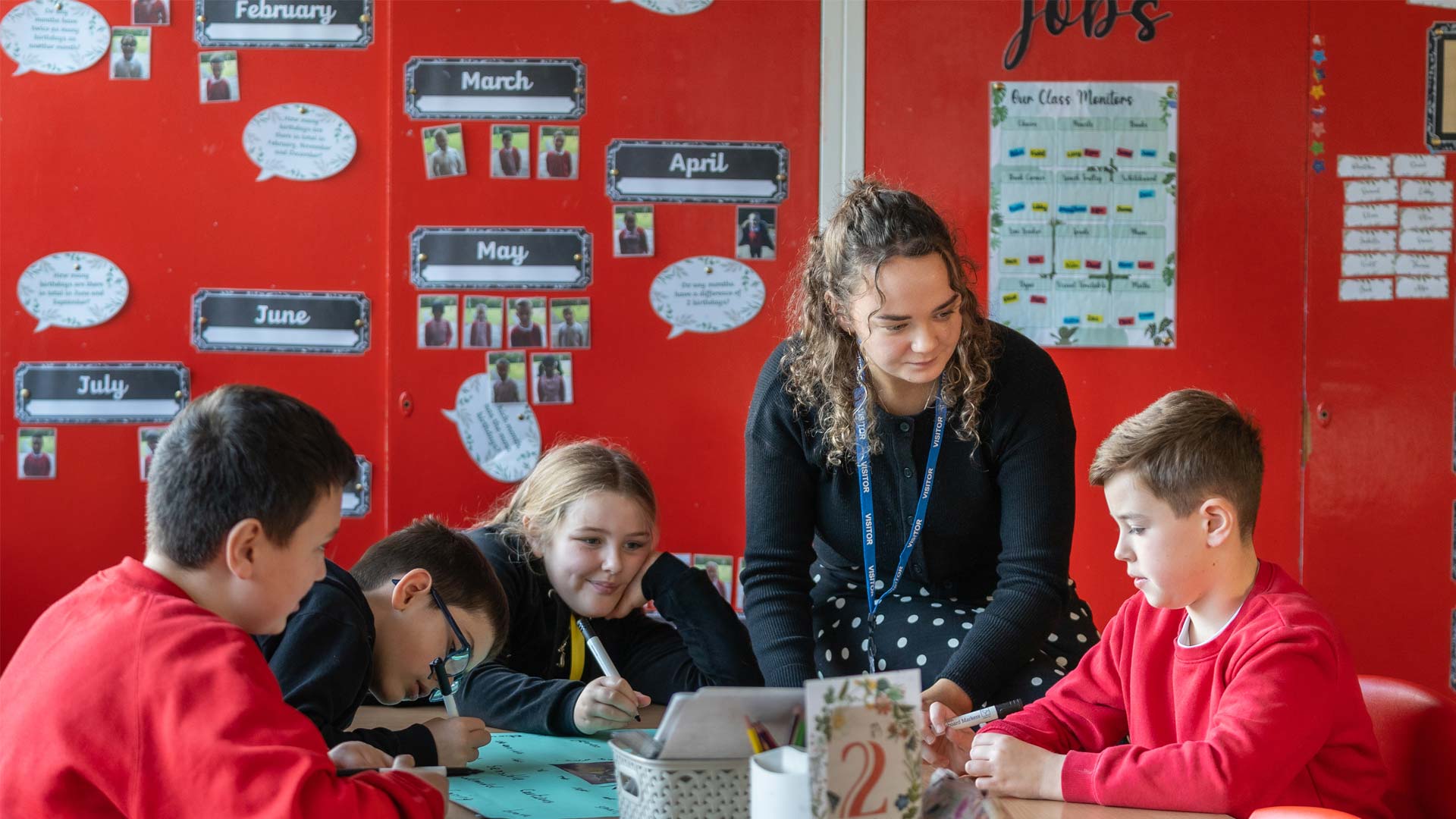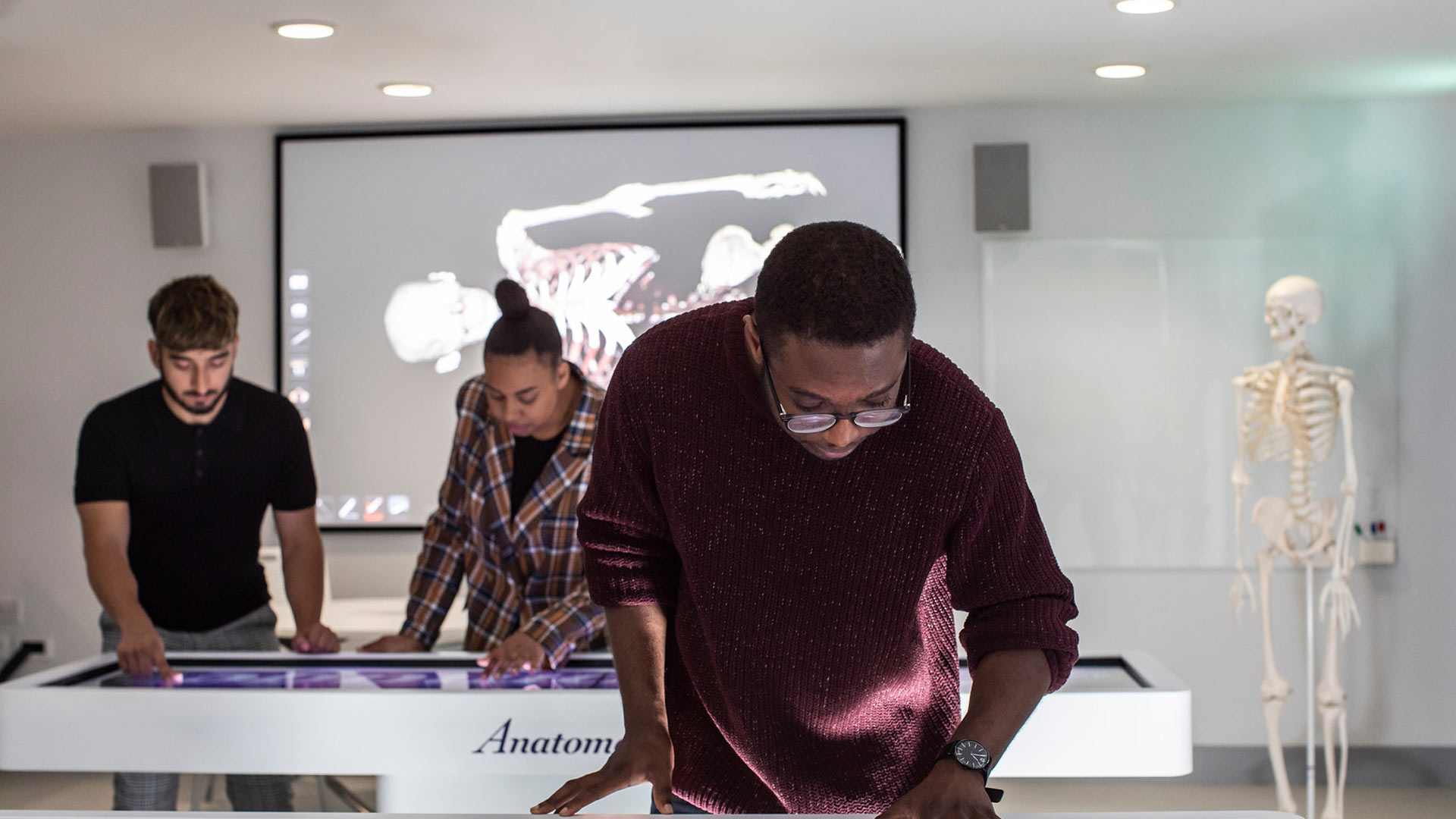
Embark on a transformative year towards a rewarding career in teaching. With our jam-packed PGCEs, you’ll create engaging lesson plans, get extensive experience in the classroom and continuously evaluate your approach.
- Our partnerships with over 1000 schools, including mainstream, SEN and forest schools The chance to learn from our research-active experts who apply their latest findings to the classroomThe offer of Ofsted quality initial teacher education, recognised as ‘outstanding’ across all three initial teacher training age phasesHaving access to a fantastic support network that you can depend on, preparing you for graduation and helping you to overcome any challenges in your first year of teachingOpportunities of financial support for selected placements
Our courses
We offer a range of PGCEs across a variety of age phases and specialisms including Early Years (3-7), Primary (5-11), Secondary (11-16) and Further Education and Skills.
Early Years Teacher Training
Helping young children learn and develop to their full potential is a rewarding experience. Teaching across the Early Years Foundation Stage and Key Stage 1 curriculum allows you to be creative, making learning interesting and lively for young children.
Teaching in the early years is focused on the Early Years Foundation Stage (EYFS) and the National Curriculum at Key Stage 1. You will engage with, and have knowledge of, the prior and following age ranges (under threes and Key Stage 2). Your PGCE year will support your knowledge and understanding of child development and play-based pedagogical approaches to learning. You’ll develop in your skills and experience to graduate as an Early Years Teacher, well prepared for work in a variety of early years settings.
Possible additional specialist teaching experiences within the programme include music in the early years, Forest Edge outdoor learning sessions, confidence and resilience building activities, Paediatric First Aid training with Millie’s Trust and a Special Educational Needs and Disabilities (SEND) experience.
Early Years Teacher Training courses
Primary Teacher Training
Teaching in a primary school is an important and fulfilling vocation. Helping children learn and develop into confident young people is a source of satisfaction for all teachers; their progress and positive responses are the just rewards for hours of careful planning.
As a primary teacher you can be creative about how to make learning come alive for children. Facilitating structured, practical and active experiences ensures they are always eager to learn and to reflect on what they have been taught. You will learn to employ drama, role play, discussion, the internet, games, songs, stories, poems, practical activities and multimedia to promote children’s learning.
The diversity of primary teaching will challenge you to extend your subject knowledge. The more you know about each subject, and each child in your class, the more you will be able to identify opportunities to link children’s learning in different subjects.
Primary Teacher Training courses
Secondary Teacher Training
Educating young adults and inspiring them to share your passion for a subject is one of the main reasons people choose to train as a secondary teacher. Outstanding teaching requires enthusiasm, an ability to communicate clearly and to make complicated concepts accessible for all to learn.
An understanding of how pupils of varying ages and abilities learn most effectively is important. Imagination is crucial, as is the need to challenge and support, and the ability to develop and sustain excellent relationships with pupils.
Seeing a child evolve into a mature and confident young adult throughout their time in secondary education, especially if also working as a form tutor, is something that teachers find particularly gratifying. Helping pupils begin to shape an idea of their chosen career path in life is a very powerful and rewarding responsibility for secondary teachers.
Secondary Teacher Training courses
Further Education and Skills
The opportunity to help learners get a second chance in achieving their ambitions can also inspire those considering training for the Further Education and Skills sector. These learners are often ready to seize opportunities and meet new challenges, making exceptional and committed students.
The Postgraduate Diploma in Teaching (Further Education and Skills) is an ideal opportunity if you want to pursue a career teaching in further education. The skills and knowledge that you will acquire as part of the course will also be transferable to other graduate-level jobs relating to education, such as pastoral roles within schools and colleges, education roles in cultural and historical organisations (museums, galleries, historic properties, etc.) and also education roles within large corporations.
Further Education (FE) also encompasses Adult and community learning (ACL), Work-based learning (WBL), Offender Learning and FE Colleges. Teaching and working with learners from across this sector is quite different from teaching in a mainstream school and offers many rewards and challenges.
Learners arrive with a wealth of both academic and skills-based experience, and teaching them requires approaches which both connect and celebrate the experience and diversity they have. An existing knowledge base among learners can mean a class full of lively debate and teachers should create an environment of mutual trust and respect, where views and opinions can be openly and freely discussed.
Further Education courses
Subject Booster courses
If you do not have a degree in the area you would like to teach, we offer Subject Booster courses to get you up to speed and to support your entry on selected Secondary PGCE programmes in Biology, English and Religious Education.
Subject Booster courses
Teacher training FAQs
- What qualifications do you need to teach in England?
To work as a teacher, you need to have Qualified Teacher Status (QTS) status to teach in early years, primary or secondary settings. You will need to have Qualified Teacher Learning and Skills (QTLS) status if you want to become a teacher or trainer in the further education and skills sector. Successful completion of one of our PGCEs (Postgraduate Certificate in Education) or one of our Postgraduate Teacher Training course will lead to a recommendation for QTS or QTLS.
- How much time will I spend in schools?
Most of your course will be spent learning hands-on in schools. This includes planning and delivering your own lessons, progressively gaining confidence in teaching as your timetable increases. You’ll become involved in all aspects of the school setting life, taking charge of your student’s achievements. You can expect to engage in regular discussions on current education issues, supported by online materials. We also encourage you develop your proficiency in digital skills to help you become an impactful educator.
What opportunities does a PGCE offer?
Fees and funding
Our money matters guide outlines the tuition fees and financial support arrangements for UK students joining a PGCE at Edge Hill University. Find out what student funding you may qualify for and how to apply for it. We encourage you to explore all potential sources of additional funding to maximise payment support.
PGCE fees and funding guide: 2025/26 entryPGCE fees and funding guide: 2024/25 entryBursaries
Department for Education bursary
If you are joining selected Secondary PGCEs in academic year 2025/26, you may be eligible to receive a Department for Education bursary worth up to £29,000.
For academic year 2025/26, the bursary scheme is based on your:
- teacher training subject and degree classification, or,
- the highest relevant academic qualification achieved.
You must also be eligible for financial support under the Student Finance England criteria (or equivalent funding body for Scotland, Wales or Norther Ireland). These bursaries are tax-free and don’t need to be paid back.
Find further details on our PGCE money matters guideFurther Education (FE) Initial Teacher Education (ITE) bursaries
If you are joining a Postgraduate Teacher Training course for specific subjects in academic year 2024/25, you may be eligible to receive an FE ITE bursary.
Find further details on availability and eligibility criteria with the FE ITE bursaries funding manualTeacher training scholarships
For certain subject areas, you may be eligible to apply for a Teacher Training Scholarship. These prestigious awards, worth up to £31,000 for academic year 2025/26, instead of a bursary, are aimed at outstanding graduates who are passionate about their subject and have the potential to be inspirational teachers.
Find out more about Teacher training scholarshipsOther scholarships
We offer a variety of scholarship awards for prospective and current PGCE students. These scholarships aim to celebrate your determination, commitment and achievements, from rewarding academic excellence to celebrating success outside of your studies.
You can also take advantage of career enhancing opportunities by applying for financial support from our Student Opportunity Fund. This fund is available to support both eligible full-time and part-time students.
Explore our scholarshipsCheck your eligibility to apply with our scholarships calculatorNext steps
Contact us
For further information about any of our PGCEs, please get in touch with our Course Enquiries Team, who will be happy to assist you.





